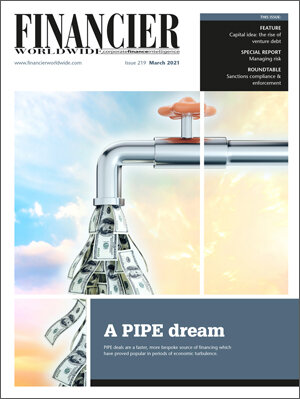24 Hour Fitness completes Chapter 11 process
March 2021 | DEALFRONT | BANKRUPTCY & CORPORATE RESTRUCTURING
Financier Worldwide Magazine
On 30 December 2020, 24 Hour Fitness announced it had successfully emerged from the Chapter 11 restructuring process.
The company now has greater financial strength with an optimised cost structure and leaner balance sheet after eliminating $1.2bn of funded debt and closing a number of locations.
“24 Hour Fitness is now well-positioned and well-capitalised to become the leading fitness provider, serving club members and guests across nearly 300 clubs nationwide at a time when a supportive and motivating gym community has never been more important,” said Tony Ueber, chief executive of 24 Hour Fitness. “Safety will continue to be our top priority as we move forward with reinvesting in our clubs and introducing new and innovative member wellness experiences to enhance our clubs.
He contined: “We are looking forward to continuing to help change lives every day by offering best-in-class fitness experiences long into the future. I want to thank our team members, club members, and financial partners for their support of our company and our strategy. As we start the new year, fitness is more important than ever for the physical and mental health of our communities. I am optimistic about the long-term prospects for our business and our industry.”
A new board of directors has been appointed in conjunction with the emergence from Chapter 11, to help the company navigate the next phase of its strategic plans.
The fitness chain had been carrying $1.3bn in debt from a 2014 leveraged buyout by a group led by AEA Investors and the Ontario Teachers’ Pension Plan, which acquired 24 Hour Fitness from private equity firm Forstmann Little & Co for around $1.85bn.
24 Hour Fitness filed for Chapter 11 protection in June 2020, citing a “disproportionate impact of the COVID-19 pandemic” on its operations. Prior to the company’s filing, 24 Hour Fitness had 445 locations in 14 states and 19,200 employees, however the Chapter 11 process has resulted in the closure of more than 100 clubs, leaving the company with a network of 286 clubs in the US – 91 are currently open, with 36 of 24 Hour Fitness’ 174 Californian clubs open for outdoor fitness. The company is believed to have reduced its staffing headcount by around 60 percent during its restructuring.
In October, the company announced a restructuring support agreement with lenders holding approximately 73 percent of its secured debt and approximately 65 percent of its senior unsecured notes. According to the plan, there will be a cash recovery of 1 percent for unsecured creditors with claims less than $250,000, and for certain unsecured creditors with claims between $250,000 and $400,000. Remaining unsecured creditors with larger claims would share in five-year warrants for up to 6.5 percent of the reorganised company’s equity, subject to dilution, at a strike price based on a total enterprise value of $1.2bn. According to the disclosure statement, the warrants are valued at $300,000 to $2.2m, with a midpoint of $1m.
General unsecured claims, which include senior note claims, are allowed in the amount of $900m, according to the disclosure statement, with a recovery rate range of 0.1-1 percent. Holders of membership agreement claims against the company in amounts less than $250 will receive a $25 gift card, while holders of claims in amounts greater than $250 will receive a $50 gift card. Total membership agreement claims would be allowed in the amount of $13m and the recovery rate for claim holders is estimated to be 5-6 percent.
Debtor in possession (DIP) lenders that had provided the company with a $250m loan will receive 95 percent of the equity in the reorganised company and up to $200m of a contemplated exit facility. The remaining 5 percent of the company’s common equity will be distributed to lenders under the company’s pre-petition credit agreement. With allowed claims of about $690.8m and total reorganised enterprise value of $538m, the company’s disclosure statement values the recovery at 2.5 percent.
© Financier Worldwide
BY
Richard Summerfield

